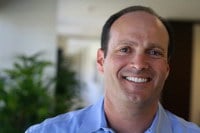Tuesday, June 16, 2009
Interview with Jason Spievak, RingRevenue

Earlier this month, Santa Barbara-based RingRevenue (www.ringrevenue.com) announced that it had raised a round of venture funding. We caught up with the firm's CEO, Jason Spievak, to learn more about the firm's technology, as well as to hear about the company's experienced team, which came out of Callwave.
Explain your technology?

Jason Spievak: At a high level, what we do, is enable affiliate networks to track calls like they do clicks. There's a lot of complexity behind that, but that's the basic element to what we do. It enables them to allow advertisers to run campaigns through affiliates, where you can drive calls and not just clicks.
How does this work?
Jason Spievak: The way it works today, is if you were a publisher, and you wanted to promote a call-based campaign, you'd log in through your chosen affiliate network--such as Commission Junction. Once you are authorized to take a phone number, you can apply it to a campaign that is running, and we'll start looking for calls as well as clicks. This is good for people in the mortgage and finance area, where people might shop online for a mortgage or refinance, but nobody clicks to buy, but will get on the phone to get their questions answered, or an appointment scheduled. The way it works today, is a web site might have an affiliate link, people looking for a mortgage or refi will input their info, and hit submit. That affiliate passes that to the advertiser, and minutes or hours later will call the potential customer back at their phone number. Because of a combination of factors--the wrong number, the person is no longer there, etc--only half of those result in a successful reconnect with a potential customer. What we did, instead, was enable affiliates, particularly on higher margin or more complex products like insurance, travel, or education--to call someone. At any time in the customer conversion funnel, a unique, toll-free number follows them through the process. So, at whatever point in time, they can call the big, red, toll free number--and that number they see will be unique to each combination of advertiser, campaign, and affiliate, and the specific media placement by the affiliate.
It used to be your phone number was your brand--do you hear any issue from companies with that changing phone number?
Jason Spievak: With the prevalence of pay-by-call solutions, advertisers are finding this compelling. There is 300 billion or so spent on advertising in the U.S., but less than 10 percent of that is spent online. As technology people, we all live and breathe Yahoo, Google, Microsoft, and AOL. But, today, that still online combines to equal less than ten percent of the advertising market. Ninety percent, or 1/4 trillion is spent offline, to drive that store visit or a phone call. $250 billion is spent to drive about 20 billion, inbound sales call to U.S. call centers every year. To answer your question, vanity numbers for business are less of a factor. It used to be that 1-800-dentist or 1-800-flowers number was the brand, but now, once you've been brought into a merchant's web site, you don't care what number is displayed. What we can do, as a result, is pass through a unique, toll free number specific to the combination of advertiser, campaign, media placement, which is swapped out dynamically as a merchant's page loads. It's invisible to the visitor. In the process of being a customer, that number allows us to correctly determine the source of a lead, and make sure an affiliate gets paid.
It might be worth talking about your team, which has a lot of experience. Can you talk about the background of the team?
Jason Spievak: We do have an experienced team, which we were fortune to be able to pull together. We have worked together for nearly a decade. We've been doing a combination of advertising and telephony. Our background is from Callwave, which we took from a startup to $50M and profitable, and an IPO at the top of the market in 2004. We have a team which has worked very closely together, and has a deep skill set in online advertising and software based telephony, which is unique to coming in here and servicing this market effectively. You have to have the experience of handling millions of phone numbers, and billions of calls, to service this market.
With the huge amount of Voice-over-IP technology available right now, what keeps a team for easily doing something similar to what you are?
Jason Spievak: There are a few call tracking companies, companies like Ingenio and Marchex, who have been pretty successful in their own right. But, they have not built a platform for the affiliate marketing industry. We did extensive customer research and testing to develop our platform, which has the functionality, control, and visibility that advertisers, publishers, and networks need. Affiliates are a multi-billion dollar industry and growing. Our product has only been live for less than nine months, and four out of the five biggest affiliate networks have chosen us. Call tracking hasn't been built specifically around the needs of those networks, because of the depth and complexity.
You've got lots of people out of Callwave -- what do you think of the drama there nowadays?
Jason Spievak: Our first seven people were from Callwave. Our three founders, Colin Kelley, Rob Duva, and myself. We haven't hired anyone directly out of Callwave, but the first four were also former Callwave employees. Unfortunately, Callwave hasn't been able to reach its potential. The firm has a deep understanding on how to optimize revenue yield, but it has the constant management turnover and pressures of being a small cap public company. I'd love to see a more profitable outcome for the post-IPO folks, but the best thing for that company is to be private--the overhead as a small cap is unbearable.
Thanks!